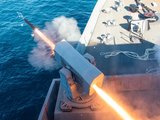US will be 'good ally' to Philippines in South China Sea dispute
The US will be ‘a good ally’ to the Philippines in responding to territorial conflicts in the South China Sea, a US defence official said on 16 August.
Randall Schriver, Assistant Secretary of Defense for Asian and Pacific security affairs, gave the assurance as tensions rise over China's aggressive stance towards its claims to most of the strategic waterway.
Speaking to reporters at the US embassy in Manila, Schriver was asked if the US, which is bound to the Philippines by a mutual defence treaty, would help the country if China invaded the main Filipino-occupied island in the South China Sea.
Schriver said: ‘We'll be a good ally... there should be no misunderstanding or lack of clarity on the spirit and the nature of our commitment. We'll help the Philippines respond accordingly.’
China and the Philippines, along with several other Asian nations, have conflicting claims to parts of the South China Sea, which is believed to contain vast mineral resources.
China has built up heavily defended artificial islands in the sea and Philippine observers have expressed concern in recent weeks over aggressive Chinese radio warnings to foreign planes against approaching them.
However Schriver said US forces would continue to fly and sail in those waters.
He said: ‘We've seen an increase in this kind of challenge from China, not only directed at us but others. This kind of challenge will not result in a change of our behaviour. We'll not allow them to rewrite the rules of the road or change international law.’
Since he took office in mid-2016, Philippine President Rodrigo Duterte has been moving the country's relations away from its traditional ally the US and towards China and Russia.
Schriver also cautioned the Philippines against buying large-scale weapons like submarines from Russia as some local officials have suggested.
He said: ‘I don't think that's a helpful thing to the (US-Philippine) alliance and ultimately I think we can be a better partner than the Russians.’
More from Defence Notes
-
![Singapore Airshow 2026: ST Engineering hints at export success for AME assault rifle family]()
Singapore Airshow 2026: ST Engineering hints at export success for AME assault rifle family
The Singapore-based technology company unveiled its new rifle family at this week’s airshow. Chen Chuanren spoke with the ST Engineering’s head of small arms to find out more about how the weapons have been refined.
-
![High tension in the High North – a wake-up call for NATO’s future Arctic defence efforts?]()
High tension in the High North – a wake-up call for NATO’s future Arctic defence efforts?
Any potential ‘Arctic Sentry’ mission would be months in the planning, but with tensions high in the region given the US’s push for Greenland, NATO countries will need to continue to emphasise their commitment to the region, analysts have said.
-
![Venezuela prepares personnel and equipment for a potential second US attack]()
Venezuela prepares personnel and equipment for a potential second US attack
Defence Minister Gen Vladimir Padrino López has declared that the Venezuelan armed forces “will continue to employ all its available capabilities for military defence”.
-
![As the new year starts, the UK defence spending delay continues]()
As the new year starts, the UK defence spending delay continues
The UK’s defence spending commitments remain uncertain as the government’s Defence Investment Plan, which had been due by the end of 2025, is yet to be published.
-
![How might European countries look to tackle drone incursions?]()
How might European countries look to tackle drone incursions?
Disruption of infrastructure in Europe, whether by cyberattack, physical damage to pipelines or uncrewed aerial vehicles flying over major airports, as has happened more recently, is on the rise. What is the most effective way of countering the aerial aspect of this not-so-open warfare?

























